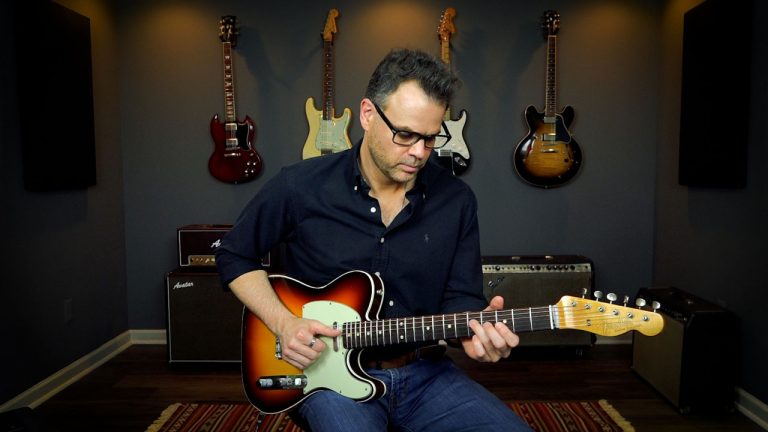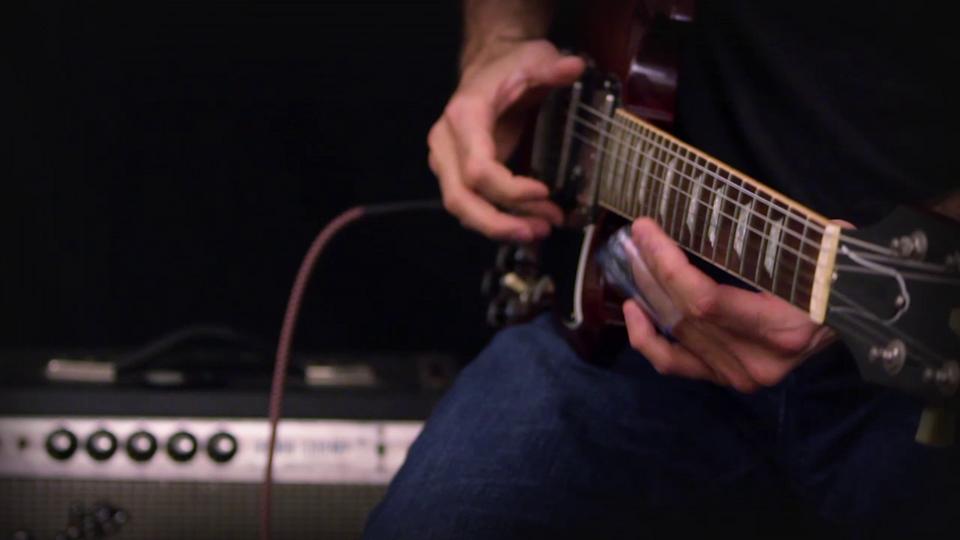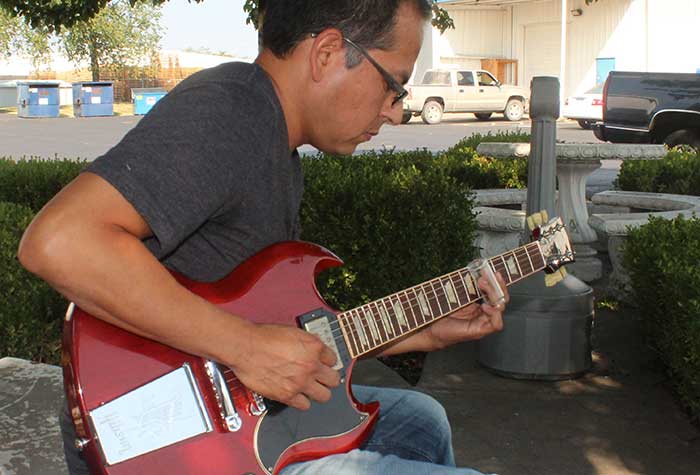There comes a time when you’ve learned so many new concepts, scales, techniques, etc…, that you have to take a step back and stop thinking about the technical side of music while you’re playing.
It’s true that you must learn about the technical aspects of playing blues guitar, but at some point, you must spend some time just playing without thinking about scales or anything.
SCALES ARE NOT MUSIC
I’ll say it again.
SCALES ARE NOT MUSIC
Just in case you didn’t hear me.
SCALES ARE NOT MUSIC
Ok I think you get the point.
You can get so bogged down in learning the technical side, that you forget what the blues is all about in the first place. I’m guilty of this as well.
Do you think Duane Allman was thinking about what scales to play when he performed Statesboro Blues or the Solo in Stormy Monday? I highly doubt it, and you can tell because his playing is very non-scalular. Is that a word?
Derek Trucks in an interview stated that when he practices now, he sits around and tries to come up with cool licks and riffs.
If you have a practice routine and regularly practice your scales, you must spend some time just playing without thinking. Finding the balance between them is the key I believe.
Nothing to Say
After I had been playing for a few years, my playing suffered from too many scale-like passages. I practiced scales for about an hour a day for a couple of years and in the process, I gained a lot of technique with not much to say. I then really got into blues playing and found it very hard to get the same emotion out of my guitar that Buddy Guy got on his Damn Right I’ve Got the Blues Album. I wore that one out I tell ya’.
Now there’s nothing wrong with practicing your scales and I highly recommend it, but you have to spend some time playing what you feel.
As they say in baseball, “You Play Like You Practice” is applicable to guitar as well. If you practice scales and technical aspects all of the time and don’t balance it out with playing what you feel, then when you perform you will sound like a technician not a musician.
This is what I think separates a lot of the players today. There’s so many people who are technically amazing, but many of them don’t do anything for me. There are however some who are technically amazing and play with tremendous feel.
so the next time you sit down to practice, spend at least 20 minutes just playing without thinking about anything. You might be surprised at what happens.
To completely blow your mind and get you out of scale playing, try playing slide guitar.




I like to run through scales in a different key each day as a warmup, just enough times to get through each pattern cleanly–to get limber–takes about 5-15 minutes depending on how particular I am being…hardly an hour a day for years, but it helps keep the box patterns and blue notes cemented in my head. I also wind up making less mistakes when I get to practicing whatever licks I am working on at the time.
That’s great Bryan. Do you spend time playing without thinking about it after that?
Not too much. I am still working through the first ten licks on Blues DVD 1, so I don’t feel like I have enough material to improvise over the backing tracks. I should probably start playing over backing tracks to end my practice sessions to work on just playing what sounds/feels good to me.
John, this is great advice. I probably practice licks and learning actual music much more than scales. I probably do that too much so you’re really on point about finding a balance.
That’s what’s it’s all about.
Many people think that by learning more scales they will become better guitar players. But they usually don’t realize that what they really need is to learn how to use at least one scale properly. How to make it sound good in real music.
Thanks for the reminder.
I forget where I left my guitar sometimes. :)
Eric Gales is a mind blowing guitarist and a very humble person, unlike Joe B. who is very good but is completely full of himself. Who would you rather listen too?
Now, some one like Taj Mahal who does not have the technical chops, plays with great feeling feeling and communicates with his listeners.
It’s often what you “don’t play” or the space you leave that can make a compelling solo.
Thanks for reminding us about this John.
Peace
Denny
What I like to do is set up my Ipad pick some random blues music and play along with it, making up my own licks. And trying NOT to imitate. No scales anymore…….. This works for me and my practice regimen.
GREAT POST – it can be a challenge for students to hop this hurdle but sometimes just pointing this fact out can help. I must admit I tend to struggle with this idea in my own playing and practice as well. I have been practicing (saxophone) more lately; scales, technique, articulation etc. – and it definitely has helped my stamina and tone. But I have become a stronger performer simply because my mind is free to wander and create without wasting any RAM on specifics that tend to bog us down. Looking forward to sharing this via twitter – keep up the good work.
PS – I have a blog soon to be published that addresses the issue of Practice or Play – it will be available here: http://www.dlpmusiceducation.com/ with links to our blogs on the right side of the page.
Cheers from Dallas!
Agree. Victor Wooten is also a very outspoken advocate for “play” practice.
I agree with you in every word. Technical knowledge is a must – no question about it… In my opinion you have to play over backing tracks and improvise and let it flow… I recorded some of these sessions and I wonder what was happen when emotions come to play…
i need a lesson group or a being to end lesson i havent play for around 30 years i played mostly southern rock and eric clapton also please reply
I will run scales to loosen up and stretch my fingers before taking on a lesson or playing to a CD or Pandora. Probably the biggest disappointment is trying to find some with a pulse and not the radio or CD to jam with. But at least I can play along (figuratively) with you John.
Hello Art,
Have you not found the wonderful world of backing tracks on you tube? Here is a link to a blues track that I really like
it is in the key of C https://www.youtube.com/watch?v=8PzyEtQypYA&list=RDDBE2WeRu7lo
This link will get you started Have fun
Scott
I understand what you’re saying. I’ve only been playing [or trying to ] for about a year and a half. I do the scales thing as well….but one day I thought this just doesn’t feel the way I feel inside…so at the risk making a fool out myself, I just started combining notes and went for what I felt inside…what sounded right to me, and was surprised at what came out! Now I want to do more…I love it. You are right!!
When I switched from playing metal to Praise and Worship and blues scales is all I saw spent 6 years endulging inscales modes fancy chording. It did make my playing better but I ended up frustrated in the writing mode the last year or so I do designated practice time I spend about an hour or so working on stuff with my rig if after about 10 min nothing happening I go ok today not the day I put up the guitar till after dinner, I sit watching tv having family time and Whallah I find I come up with some my best stuff not thinking so hard, Its the whole be relaxed and be yourself thing I think. Your lessons John BTW have been one my best resources for inspiration Thanks my brother for all you do, I wish I could afford all your lessons, Would be great for my church music. Blessings
YOU STILL NEED SCALES IF YOUR INTO JAZZ……MOST ROCK PLAYERS MOSTLY RELY ON THE BLOCK FORMS…..ITS ALL GOOD, AS LONG AS YOUR PLAYIN….JUST KEEP PLAYING!!!!!!!
Hi John,
I agree with your conclusion: balancing theory with pure improvisation is key. With limited time to practice, I find it hard to do both and I end up learning songs, playing musical lines from my head instead, and focusing on phrasing, which is good, but not ideal, as I understand that theory is only there to help us.
I see you wrote “To completely blow your mind and get you out of scale playing, try playing slide guitar.” Well, I have a very nice lap steel slide guitar and it’s very exciting to play it, when I do, but it seems like a whole new instrument to me: the tuning is different, so your scale pictorial map is gone. Almost every song uses a different tuning, which can be frustrating. I guess what you mean is that we should try to develop musical intuition playing by ear, and playing slide can be a good way to do so. Is that what you meant?
Thanks for your website. I have a few of your courses, and I enjoyed the article.
I agree we begin needing some scales as a learning structure but who is to say if the note isn’t in the scale but it feels so right do you not play it after all the best blues comes from the soul and feeling
I worry I spend too much playing without thinking about it, instead of being more methodical. My theory side lets me down as I’m always looking for the easiest route to learn things or just plain don’t bother because I know I’m only a living room star anyhow. I don’t play live so why do I need to know all the root notes etc? Then I come up against problems because my playing to me sounds dull and I realise why, because I don’t know enough theory, like root notes etc…?